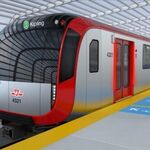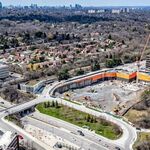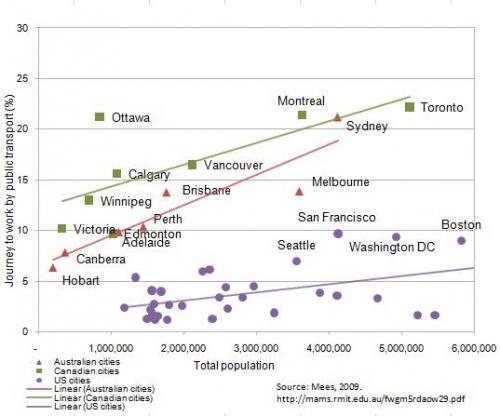Time for a massive reply dump.
Streetcars to bus.... Ok... Show me a bus route in Toronto that is busier than the busiest streetcar route.
You're comparing bus routes in suburbia to a downtown route. Stop with the bad faith arguments.
What is the improvement that will work to draw more people to VIVA? Short answer, not much.
You said it yourself, higher frequencies. Seems easy to do.
If there isn't a demand for 5 minute frequency due to ridership, that would be a waste.
Agreed. If there isn't demand for 5 minute frequency on a bus route, an LRT is a waste.
Define good transit. Do you really think London Transit or London city council can create a better bus system? What has stopped them up till now? It would be better if it is done right the first time. K/Wdid that. Ottawa and York Region didn't.
? You're trying to say something?
If London Transit can't do a good bus system, what makes you think they'll be competent at an LRT?
There is no "crosstown" route that would work. I can think about 6 different points that it would need to hit. None of them would be on the same route. That would mean you would need to build out 6 different directions to BRT. Then you need to upgrade them all eventually to LRT. To see the Ottawa stations torn down is such a waste, when if they had built them better, or had they just did the LRT from the get go, it would not be a waste of taxpayer dollars.
Outside of Alberta, which had so much money they didn't know what to do with it, no city of 500,000 could afford an LRT in the 1970s.
The stations are just large bus shelters. They could have been reused, had the city chose to do so, but they wanted level boarding. Source: living in Ottawa for a few years.
I haven't said nowhere else has done BRTs. I will say that it does not seem that most systems remember the (R)apid part. Ottawa forgot that downtown.
Ottawa's downtown segment was too successful and too high ridership. If that's failure, I want more!
Edinburgh has a tram line and lots of commuter rail lines.
Seoul has various rail transit too.....
Not really disproving my point......
Your argument was that we can't have BRT in urban areas.
Edinburgh and Seoul are also large cities. If they can do it, so can London.
What if Ottawa built this as an LRT when they acquired the ROWs Wouldn't their system be about the same as their Phase 2?
No, because they would have had to build a tunneled ROW to get the capacity which they have now. That would have costed as much as the rest of the Transitway put together.
Well, if I were to believe London is serious about transit, then I would expect what Kingston did. Notice how that is not happening? This isn't about what is best for everywhere. This is about what is best for London. What I am seeing is BRT will be a flop.
You can either have an overcapacity BRT or a useless BRT. Pick one, then stick to it.
So, the constant issues with their new operational system should be ignored too?
The issues stem from poor maintenance, which a smaller system can easily have. If OCTranspo is that bad, imagine LTC doing it.
My biggest concern is whether it will be done to true BRT standards or will it be just a reserved lane that is blocked by who knows what else that wish to park there.
LRT would have the same problem. But right, it's a choo-choo, and
@micheal_can can't live without those!
So, imagine 20-30 years from now that happening to Londonites. Why waste the money now? Why not improve the existing system instead of spending more money just to see it wasted decades from now.
I thought you said it was going to have low ridership because it's a bus which is for poor people?
No. I am saying that if the plan was to go LRT, doing BRT, especially in a city know for bad bus transit is a bad idea.
Again, if they're bad at operating bus service, what makes you think that they'll operate good LRT service?
Let's look at the just buses and see why they are so busy.
The only 2 are Winnipeg and Victoria.
Winnipeg is where New Flyer is based out of. I am thinking the city council is very open to showing how good the bus can be. I'll bet that Winnipeg gets to over 1 million residents before they think of doing an LRT.
Operations > construction. If you can change the operations to get a similar result for less, then that's the way to go.
Victoria has a horrible traffic problem and very few routes that it funnels through. Their buses get stuck in the same congestion, but it is better than driving as the price of gas is one of the highest in the country. $1.65/l is a good reason to park the car.
Today's best 10 gas stations with the cheapest prices near you, in Victoria, BC. GasBuddy provides the most ways to save money on fuel.

www.gasbuddy.com
Isn't that ideal for a fixed-route LRT?
The rest alllllllll have LRT or other rail transit.
So? Is this a dick measuring contest? If not, then "they have it so we have to have it too" doesn't count as an argument.
I agree with that. This is why not doing anything and cancelling the LRT is not the end of the world. AFAIK it seems the goal is not a BRT system, but a reserved lane downtown where all the buses funnel through.
And? What are you trying to say?
You like your taxes being wasted?
Show me existing systems in Canada where they did not change the service it receives, but they rebuilt it.
What are you trying to say?
So, we think with this "improvement" BRT would be a success from this council or transit authority?
You think LRT will be a success? I think you're just operating on bad-faith arguments.
I decided to clearly explain my point in once simple post.
LOL.
I am not against BRT.
I am not against express buses.
I am not for LRT.
Really? Doesn't seem like it.
I am for spending taxpayer money once.
It is a waste to rebuilt an area for express bus just to rebuild it for BRT.
It is a waste to rebuild an area for BRT just to shut it down and rebuild it for LRT.
Is London going to rebuild the BRT for LRT? Or is this another fantasy scenario that you've farted up?
A car centric city, such as London, which has horrible transit is not going to give up their car for another bus. Regardless of what that bus is doing, they have grown up to hate it. So, something that is not a bus will have them think twice about switching.
Is this more useless arguments with zero proof?
Please, if you're going to argue anything, provide
some sort of evidence.
Stations should not need to be rebuilt because you were too short sighted. We are not learning from our past. So many of our cities ripped up their streetcars at the promise of better service with buses, only to now begin to rebuild some of the old system. By the end of WW2, most systems were in dire need of reconstruction due to lack of maintenance due to the war effort. Had we simply rebuilt the system; basically replace rails that were too warn.
So, now we are trying to rebuild it with a bus and call it BRT.
BRT is:
1) dedicated ROW.
2) Busway that is physically separated from traffic.
3) Fair paid zone. No paying on board.
4) Signal priority
5) Platform level bordering
Unless your precious LRT is getting those too, don't try to argue with that.
Of those, if LTC were to do this, there is a good chance for maybe #1, but less likely for the rest given their track record. That means ... It - is - not - BRT......
So why waste taxpayers money?
Why waste even more taxpayer money for an LRT that's going to have the same operational deficiencies?
It's clear that you think that LRT would run like Ottawa's while BRT would be like the Eglinton East lanes, while in reality, the LRT would run on the same lanes as the BRT.
It's clear that you've made contradictory statements about ridership.
It's clear that you think an agency which can't run buses well would run a train well.
It's clear that you haven't got any actual evidence for what you're saying, just a bunch of cobbled together anecdotes.







